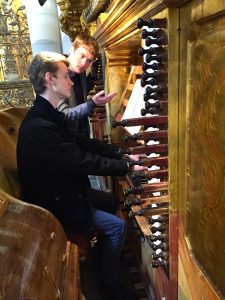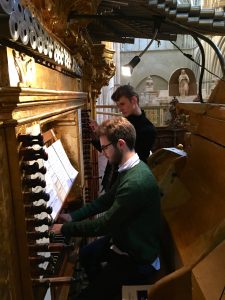Of the seven works or acts of Mercy for reflection,
this evening mine is that of visiting those imprisoned.
From our second reading this evening:
Remember those who are in prison,
as though you were in prison with them;
those who are being tortured,
as though you yourselves were being tortured.
The Flemish Artist Pieter Brueghel the Younger depicted this in his painting “The Acts of Mercy” – of which a number of variations were painted.
For those unacquainted with this painting
he paints a sort of “Where’s Wally?” picture.
Lots of little characters busy about their activities of goodwill.
There in the top left hand corner is a man with his legs shackled in stocks, being comforted by well-to-do visitors.
The jailer sits wearily alongside,
whilst behind, faces peer out through a lattice-work of bars.
We might look at it and we can be intrigued like a bystander.
But Christians do not believe they are called to be bystanders,
but to live connected to the lives and circumstances of others,
all those with whom we share our lives, indeed everyone.
So we are invited beyond just proclaiming interdependence
as our view of living, to acting upon it.
We live interdependently and so, as regards acts of mercy
we are summoned to demonstrate personal goodwill.
Now, getting access to visit a prisoner, going through security there,
is not unlike airport security, but you have to leave things behind,
like keys and phones.
Life goes out of one’s own control as one enters, generally,
what is a strange place, but it is a territory from which one will surely return.
It is a place in which an outsider,
uncomfortably longs for the comfortable outside, and to be a bystander.
So the feeling of walking out, after a visit to a prison,
is one which becomes a real moment of relief.
This relief can be deeper recognized when later on it is shared
when the one who was visited in prison, is released back into the community, back home, and visits me at my home.
His relief takes the form of him smiling with embarrassment
when I am discretely shown the “early release” ankle tag.
Brueghel’s depiction of visiting those in prison leaves us as bystanders,
and there is much in all acts of mercy –
all acts of charity – which can be too limited.
The late Anthony de Mello, a Jesuit,
imagined a story of the time God gave a party to all the virtues.
Great and small, humble and heroic,
they gathered together in a splendidly decorated hall in heaven.
They soon began to enjoy themselves
because they were well acquainted with each other.
Indeed some were even closely related.
But then God spotted two virtues who seemed not to know each other and were ill at ease in each other’s company.
So God formally introduced them to each other.
“Gratitude,” God said, “this is Charity.”
But God had hardly turned round when they were again parted. And so the story got round that even God cannot bring Gratitude to be where Charity is.
There is no guarantee that any works of mercy,
and especially that of visiting those imprisoned, will bring gratitude.
And this is above all, because the approach is often of a bystander
who comes to observe the prisoner.
Etty Hillesum, a young jewish woman, lived in Nazi occupied Holland.
She was inspired by writers such as Rilke and his mysticism.
On 30 July 1942 she moved into the transit camp for Jews and others at Westerbork.
She wrote in her diary two days before she moved into the camp:
“At this moment I know, more certainly than ever,
that I have a task in this life, a small project specially for me.
And I shall have to live through everything.”
How reminiscent of the refrain of the psalmists, quoted by the writer to the Hebrews:
“The Lord is my helper; I will not be afraid. What can anyone do to me?”
Etty was able to move in and out of this transit camp, at times,
and with permission, even go home.
She worked hard to bring relief and comfort to those imprisoned
who were in transit – ultimately to their destination in the death camps.
She had the opportunity to stay free, to hide,
to not go back to her imprisonment.
But to choose that would mean that she was a bystander.
She made the profound moral choice – to truly live interdependently,
offering charity, and remarkably receiving much gratitude,
because she refused to just observe.
She continued to write in her exercise book diary:
“Sometimes, when I least expect it, someone suddenly kneels down in some corner of my being, when I’m out walking or just talking to people. And that someone, the one who kneels down, is myself.”
Etty’s identification with those in prison, grew deeper
as she became less detached,
which had been her stance before she entered the prison.
She wrote of her conversation with, her prayer before, God:
“How great are the needs of your creatures on this earth, O God.
I thank you for letting so many people come to me with their inner needs. They sit there, talking quietly and quite unsuspectingly,
and suddenly their need erupts in all its nakedness.
Then, there they are, bundles of human misery,
desperate and unable to face life….And that’s when my task begins.
It is not enough simply to proclaim you, God, to commend you to the hearts of others. One must also clear the path toward you in them.”
Etty Hillesum left the camp on 7 September 1943, on the daily transport to Auschwitz.
She died there on 30 November 1943.
Acts of mercy, and especially that act of visiting those in prison,
can not be carried out by bystanders.
They are carried out by those who know their own need,
their own selves kneeling down inside themselves, perhaps in despair,
and total human misery.
And yet who then find the path to God cleared within them.
Now not everyone is called to practice this act of charity, this work of mercy,
of visiting those in prison, behind physical bars.
Perhaps more may find themselves,
drawn to be present with those who experience something imprisoning in their own living.
But all, for health’s sake, can find themselves drawn to visit themselves in their own imprisonments.
We can recognize this particularly when we dangerously opt to be bystanders of our own living, and find something lacking.
For it is then that we need to sit within ourselves and clear God’s path within.
And strangely, it can often be when we are visiting another’s imprisonment with them in conversation, or just presence, that we are freed up as Etty was.
Like her we can rediscover our interdependence through acts of mercy,
not expecting gratitude,
but finding the gift for others of simple personal goodwill.





 Worcester College is looking forward to hosting a masterclass with Soprano Teresa Cahill on Friday 13th March. In the masterclass, members of Worcester’s choir and students from the University will receive one-to-one coaching on vocal technique and interpretation. All are welcome to attend.
Worcester College is looking forward to hosting a masterclass with Soprano Teresa Cahill on Friday 13th March. In the masterclass, members of Worcester’s choir and students from the University will receive one-to-one coaching on vocal technique and interpretation. All are welcome to attend.